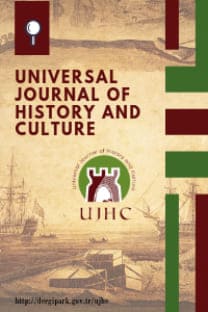History, Vision and Narrative in Ahdaf Soueif's The Map of Love
Ahdaf Soueif, Contrapuntal History, Post-Colonialism, Omdurman War, Overlapping Histories, Memory
___
- Abu-Lughod, I. (1967). The transformation of the Egyptian elite: Prelude to the ”Urabi Revolt”. Middle East Journal, 3(21), 325-344. Retrieved from http://www.jstor.org/stable/ 4324162.
- Adawalla, M. (2011). Generational differences in three Egyptian women writers: Finding common ground. Journal of Postcolonial Writing, 47(4), 440-453. doi: 10.1080/17449855.2011.590324.
- Ahmed, L. (1992). Women and gender in Islam: Historical roots of a modern debate. London: Yale University Press.
- Amar, P. (2011). Working out Egypt: Effendi Masculinity and subject formation in colonial modernity, 1870-1940. Social History, 4(36). doi: 10.1080/03071022.2011.620236.
- Ashcroft, B. (2000). Post-colonial transformation (1st Edition/Ashcroft/p/book/9780203129814 ed.). Retrieved from https://www.routledge.com/Post-Colonial -Transformation.
- Ashcroft, B., Griffits, G., & Tiffin, H. (2013). Postcolonial studies, the key concepts. Oxford: Routledge.
- Boccardi, M. (2004). History as genealogy: A. S. Byatt, Tracy Chevalier, Ahdaf Soueif. Women: A Cultural Review, 2(15). doi: 10.1080/0957404042000234042.
- Boccardi, M. (2009). The contemporary British historical novel, representation, nation and empire. Great Britain: Palgrave Macmillan.
- Boehmer, E. (2005). Colonial and postcolonial literature, migrant metaphors. Retrieved from https://global.oup.com/academic/product/colonial-and -postcolonial-literature-9780199253715?cc=tr&lang=en&.
- Brandabur, A. C., & Athamneh, N. (2000). Problems of genre in the seven pillars of wisdom: A triumph. Comparative Literature, 4(52). Retrieved from http://www.jstor.org/ stable/1771351.
- Bulfin, A. (2011). The fiction of gothic Egypt and the British imperial paranoia: The curse of the Suez Canal. English Literature in Transition 1880-1920, 4(54), 411-443. Retrieved from http://muse.jhu.edu/article/445326 doi: 10.1080/02757200701218262.
- Burke, E., & Prochaska, D. (2004). Rethinking the historical genealogy of orientalism. History and Anthropology, 2(18). doi: 10.1080/02757200701218262.
- Cole, J. R. (1981). Feminism, class, and Islam in turn-of-the-century Egypt. International Journal of Middle East Studies, 4(13), 387-407. Retrieved from http://www.jstor.org/ stable/162906.
- Crabbs, J. J. (1975). Politics, history, and culture in Nasser's Egypt. International Journal of Middle East Studies, 4(6), 386-420. Retrieved from http://www.jstor.org/stable/162751.
- D’Alessandro, S. (2011). Politics of representation in Ahdaf Soueif’s ”The Map of Love”. Bern: CHE, Peter Lang.
- Eppel, M. (2009). Note about the term Effendiyya in the history of the Middle East. International Journal of Middle East Studies, 3(41), 535-539. Retrieved from http://www.jstor .org/stable/403892888.
- EzzelArab, A. (2004). The experiment of Sharif Pasha’s cabinet (1879): An inquiry into the historiography of Egypt's elite movement. International Journal of Middle East Studies, 4(36), 561-589. Retrieved from http://www.jstor.org/stable/3880006.
- Fandy, M. (2006). Political science without clothes: The politics of dress; or contesting the spatiality of the dress in Egypt. In I. A. al Azhary Sonbol (Ed.), Beyond the exotic: Women’s histories in Islamic societies (p. 381-398). Cairo: The American University in Cairo Press.
- Hassan, W. S. (2006). Agency and translational literature: Ahdaf Soueif’s ”The Map of Love”. PMLA, 3(123), 753-768. Retrieved from http://www.jstor.org/stable/ 25486352.
- Hatem, M. F. (2006). The history of the discourses on gender and Islamism. In I. A. al Azhary Sonbol (Ed.), Beyond the Exotic: Women’s histories in Islamic societies (p. 307-321). Cairo: The American University in Cairo Press.
- Heilmann, A., & Llewellyn, M. (2004). Historical fictions: Woman (Re)reading and (Re)writing history. Women: A Cultural Review, 2(15), 137-152. doi: 10.1080/0957404042000234006.
- Hunter, F. R. (2004). Tourism and empire: The Thomas cook & son enterprise on the Nile, 1868- 1914. Middle Eastern Studies, 5(40), 28-54. Retrieved from http://www.jstor.org/stable/4289940.
- Kahf, M. (2006). Packaging ”Huda”: Sha’rawi’s memoirs in the United States reception environment. In L. S. M. In Amal Amireh (Ed.), The transnational reception of third world women writers (p. 28-45). New York: Garland.
- King, B. (2000). Review: Ahdaf Soueif. The Map of Love. World Literature Today, 2(75), 453. Retrieved from http://www.jstor.org/stable/40155793.
- Malak, A. (2005). Muslim narratives and the discourse of English. Albany: State University of New York Press.
- Maleh, L. A. (2009). Anglophone arab literature: An overview. In I. L. A. M. (Ed.), Arab voices in diaspora, critical perspectives on anglophone arab literature (p. 1-63). Amsterdam: Rodopi.
- Mehta, B. J. (2009). The semiosis of food in Diana Abu Jaber’s Crescent. In I. L. A. M. (Ed.), Arab voices in diaspora, critical perspectives on anglophone arab literature (p. 203-235). Amsterdam: Rodopi.
- Nash, G. P. (2009). From harem to harvard: Cross-cultural memoir in Leila ahmed’s a border passage. In I. L. A. M. (Ed.), Arab voices in diaspora, critical perspectives on anglophone arab literature (p. 351-370). Amsterdam: Rodopi.
- Pollard, L. (2006). Learning gendered modernity: The home, the family and the schoolroom in the construction of Egyptian national identity. In I. A. al Azhary Sonbol (Ed.), Beyond the exotic: Women’s histories in Islamic societies (p. 249-269). Cairo: The American University in Cairo Press.
- Reid, D. M. (1982). Political assassination in Egypt, 1910-1954. The International Journal of African Historical Studies, 15(4), 625-651. Retrieved from http://www.jstor.org/ stable/217848.
- Said, E. W. (1994). Culture and imperialism. London: Vintage Books.
- Said, E. W. (2003). Orientalism. New York: Vintage Books.
- Soueif, A. (2004). Mezzaterra: Fragments from the common ground. London: Bloomsbury.
- Soueif, A. (2007). The map of love. London: Bloomsbury.
- Valassopoulos, A. (2004). Fictionalizing post-colonial theory: The creative native informant? Critical Survey, 2(16), 28-44. Retrieved from http://www.jstor.org/stable/ 41557270.
- Young, R. J. C. (2005). Colonial desire, hybridity in theory, culture and race. Retrieved from https://www.routledge.com/Colonial-Desire-Hybridity-in-Theory-Culture-and-Race/Young/p/book/9780415053747.
- ISSN: 2667-8179
- Başlangıç: 2019
- Yayıncı: Orhan TURAN
Eston Bağımsızlık Savaşı Öncesi Eston Kimliğinin ve Eston Milliyetçiliğinin Yükselişi
Miraslaştırma ve Anma Biçimlerinin Karanlık Yüzü: Kolektif Belleğin Bağlamından Koparılması
Boşnak Edebiyatı ve Kimliği, Küresel Medeniyetin Etkisinin Altında
Hristiyandan Öte Ortodoks Hristiyan Bir Millet: Rus İmparatorluğu'nun Tarih Okuması
History, Vision and Narrative in Ahdaf Soueif's The Map of Love
Olcaytû Han Döneminde İlhanlı Vezirleri ve Devlet İçerisindeki Rolleri
Bir Tasarım Aracı Olarak Nostalji: Kabataş İskelesi Üzerine Deneme
Kültürel Bellek, Sözlü Kültürden Yazılı Kültüre Hatırlama
Njegos ve Dağ Çelengi: Sırp Milliyetçiliğinin Irkçı Efsanesinin Arkasındaki Metin
